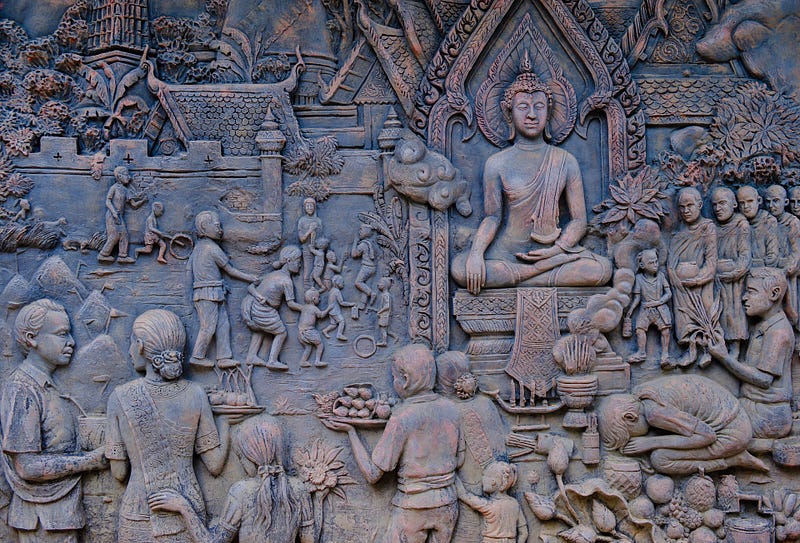Why Do We Believe? How Religion Evolved from Ancient Human Behaviors
By Amanda Bell, Biology & Computer Science, 2024

There are hundreds of religions practiced worldwide. Some believe in gods, others focus on self-improvement or a blissful afterlife; but one common feature between all religions is the sense of community they bring to a society. So how did these belief systems originate, and do their roots lie in the biology that makes us human?
Before dealing with the roots of religion, we need to address what religion is. It’s difficult to define religion because of how many variations exist, but essentially it is a set of beliefs that impose regulations on one’s life and attempt to comprehend the universe. Religion is made up of internal feelings and ideas that relate to some higher power, as well as external rituals that demonstrate either individual or community piety, from prayer and fasting to community worship.
Religion is made up of internal feelings and ideas that relate to some higher power, as well as external rituals that demonstrate either individual or community piety, from prayer and fasting to community worship.
It is hypothesized that these rituals were first performed by ancient primates to alleviate social stress. In primate societies, stress stemmed from social hierarchies: having a low status could result in harassment from peers. Rituals to alleviate this stress and bring everyone together included actions like throwing rocks and dancing in heavy rain and winds.
Over time, these rituals developed to involve repetitive behaviors like singing and chanting, or reaching altered states of consciousness like hypnosis. These activities have been shown to decrease blood pressure, heart rate, and respiratory rate, all of which are part of the body’s relaxation response. These behaviors serve an evolutionary purpose: when the mind and body are relaxed, people are better able to fight off disease and think rationally, and are therefore more fit to survive. Although the rituals used long ago by human ancestors are different from those today, rituals themselves are still part of religion in the form of fasting, songs, dances, periods of solitude, and marriage.
When the mind and body are relaxed, people are better able to fight off disease and think rationally, and are therefore more fit to survive.
Our attraction to religion may have roots in our genetic makeup. Studies imply that hypnotizability, the degree to which one can be hypnotized and reach altered states of consciousness, has a genetic basis, and may be the reason why some people are more religious than others. Those who are highly hypnotizable are more likely to have paranormal and “religious” experiences, such as hallucinating, hearing voices, or feeling the influence of external forces.
Another hypothesis suggests that religion developed as a by-product of a mechanism called the hypersensitive agency-detection device (HADD). The innate curiosity that human beings have for the world around them is HADD, which is defined by the thinking that “everything happens for a reason.” This mechanism allowed animals, including our ancient ancestors, to analyze things in the environment that appeared to be acting by themselves, like rustling grass or falling precipitation. Attributing rustling grass to the movement of a hungry predator or falling precipitation to be the sign of a storm helped humans make faster decisions to escape from threats and survive. After prehistoric times, but before the scientific method, people didn’t have concrete ways to explain natural phenomena, leading to beliefs that supernatural beings were the cause of them. Over time, these beliefs were transformed into oral traditions and eventually to written texts, becoming a foundation for religion.
After prehistoric times, but before the scientific method, people didn’t have concrete ways to explain natural phenomena, leading to beliefs that supernatural beings were the cause of them.
There are still other scientists who believe that religion developed to help our ancestors survive in groups. There will always be individuals within communities who attempt to take unfair advantage. Religion could have developed among humans to ensure that everyone contributed fairly and groups of people stayed together. The people of Ancient Egypt, for instance, believed that the pharaoh was a mediator between gods and themselves; disobeying the pharaoh would mean disobeying the gods. Ancient Egyptians also believed heavily in the afterlife, which motivated them to adhere to laws, pay taxes, and act morally so they could live well in the next world.
It is likely that a combination of all of these theories allowed religion to develop. When the calming nature of rituals, spiritual experiences in the brain, innate curiosity, and the importance of cooperation are combined, the development of religion makes a lot of sense. If there’s one thing you should take-away from this, it’s that you should find some time to de-stress, wonder about the world around you, or hang out with friends; it helped our ancient ancestors survive the wild, maybe it will help you survive college.
DOI: 10.9790/0837–201148285
DOI: 10.2307/1387852
DOI: 10.1016/j.neubiorev.2016.12.031
